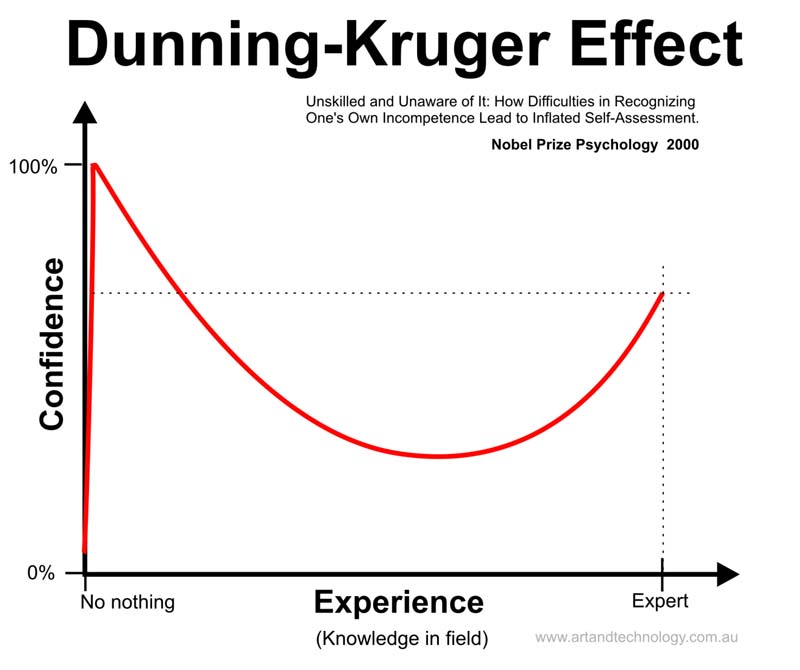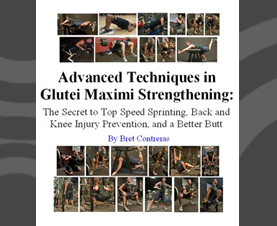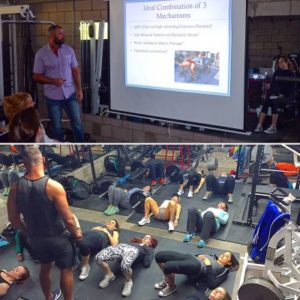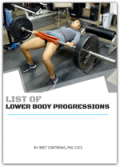If you are heavily immersed in the fitness industry like I am, then I bet you never cease to be amazed at some of the ignorance and incompetence displayed by various members of our community. It’s all over the place, and you simply cannot escape it. Scrolling through Facebook and reading the comments might make you want to do this:

Ignorance comes in many forms, and sometimes it’s hard to imagine that the ignorant person is serious. I’ve found myself on numerous occasions reading various comments on social media and saying to myself, “This guy has got to be trolling.” But it turns out that many times the ignorant commenters aren’t trolling; they’re just really dumb. But ignorance isn’t exclusive to your casual social media commenter; the experts are guilty of it too. We have a myriad of seemingly scientific writers engaging in cargo cult science – it might look and feel like science, but it’s not science. These types are unwilling to doubt their own theories, which is counter to the essence of a true scientist.
One would think that ignorant and incompetent people would know that they are ignorant and incompetent, and that they would therefore remain humble and willing to learn from others. Unfortunately, this is not the case.
The Curious Case of McArthur Wheeler
In 1995, a man by the name of McArthur Wheeler decided to rob a bank. Don’t worry, he was sure to cover his bases. Knowing that lemon juice can be used as a type of “invisible ink” by applying it to paper, letting it dry, and heating it, Wheeler applied lemon juice to his face prior to robbing the bank to conceal his identity. When Wheeler was arrested later that night and shown a video tape of him committing the crime that clearly revealed his face, he was shocked. “But I wore the juice,” he remarked.

Prior to robbing the bank, Wheeler tested his hypothesis by applying lemon juice to his face and snapping a Polaroid picture of himself. Apparently, his face didn’t turn out in his trial pic. The detectives later speculated that this circumstance probably occurred on account of bad film, a poorly aimed photograph, or simply a case of lemon juice in the eyes, which partially blinded Wheeler and prevented him from properly seeing the photo.
The Dunning-Kruger Effect
Here is a case where scientists made lemonade out of lemons. Wheeler’s case sparked Cornell University social psychologist researchers Justin Kruger and David Dunning to explore the relationship between actual competence and self-assessment of competence. As it turns out, ignorant/incompetent people are really bad at knowing that they are ignorant/incompetent.

What they found through their research was that for any given task, an incompetent person will tend to:
- overestimate their own level of skill,
- fail to recognize genuine skill in others, and
- fail to recognize the extremity of their inadequacy
Dunning and Kruger’s research has led to the dubbing of The Dunning-Kruger Effect, which is readily apparent in any field, especially fitness.
Are We All in Various Stages of Denial?
Anosognosia is a condition whereby a disabled person suffering from a brain injury is unaware of or denies the existence of his or her own disability. These individuals have a serious self-awareness deficiency, which can be neurological or physchological in nature, and it occurs even in the presence of obvious impairments such as blindness or paralysis. What we now realize is that in a way, all humans suffer from anosognosia, since we’re not always equipped with the knowledge needed to identify ignorance/incompetence.

To quote David Dunning, “If you’re incompetent, you can’t know you’re incompetent. The skills you need to produce a right answer are exactly the skills you need to recognize what a right answer is.” Though their research is fairly modern, the phenomenon relating to self-confidence and competency has been discussed for quite some time. Confucius stated that, “Real knowledge is to know the extent of one’s ignorance.” Charles Darwin noted that, “Ignorance more frequently begets confidence than does knowledge.” And William Shakespeare wrote, “The fool doth think he is wise, but the wiseman knows himself to be a fool.”
Take-Home Message
As you can see, fools don’t know they’re fools. Coming from someone who sifts through up to a hundred journals per month and spends considerable time reading and conducting research, I can tell you that quite often there’s more to the story than meets the eye. To answer a particular question, we often need to conduct multiple studies and bring in expert researchers from different fields. The fool isn’t aware of this; he thinks his intuition is sufficient. This is why we have a multitude of individuals presenting themselves as experts on topics that they’re actually clueless about, and this includes exercises they’ve never performed, methods they’ve never experimented with, tools and instruments they’ve never used, and concepts they’ve never researched or reviewed.
Next time you’re on social media perusing comments, see if you can spot the overly-confident fools versus the true experts. It’s not always easy to spot, since the fool is typically guided by a more lax code of conduct. The fool will often go for the jugular and use logical fallacies to increase his chances of appearing right. Finally, always make sure to keep yourself in check and question your own beliefs – lest the fool be you!
Research
My more savvy readers will likely want to read up on the Dunning-Kruger Effect, so here are links to full papers that you can download:
Mind-Reading and Metacognition: Narcissism, not Actual Competence, Predicts Self-Estimated Ability
Why the Unskilled Are Unaware: Further Explorations of (Absent) Self-Insight Among the Incompetent
Why People Fail to Recognize Their Own Incompetence






Bret, this is very valuable information put together in an interesting and simple way. Well done. I often question my ability to interpret things I learn, actions I take, the way I see things, behave, etc. to the point of feeling inadequate. “Real knowledge is to know the extent of one’s ignorance.” I love that quote and perhaps in order to avoid freezing and doing nothing at all, the balance is also saying “I may not have it right and I damn sure could be wrong, but Im working towards whatever optimal is, so in the meantime Ill do the best with the information and perception I have available”. Humility is a big deal.
Preaching to the choir here Matt! I totally concur 😉
Love the ironic humor hidden in plain sight in the Dunning Kruger Effect chart. Classic.
I wonder if they did that on purpose or not. What’s funny is that the chart isn’t in a study – it was created by the folks who linked their website in the lower right corner. And it’s not even accurate, based on the study they referenced in the chart – the data doesn’t match what’s in the article. But it illustrates a point so I kept it in. But based on the mistakes, I think they spelled “know” as “no” and are hence proving the point made in the article LOL!
Fun article. One correction on the image of the Dunning-Kruger Effect – they won the Ig Nobel Prize in 2000.
Thanks Evan! I didn’t make the image by the way…as I mentioned above I don’t even think the data is accurate. But it illustrates a point so I embedded it anyway.
Hence demonstrating the effect by application.
Right, I should have spent hours figuring out how to create a new image because people couldn’t possibly figure out the meaning with a misspelling…how Dunning-Kruger of me!
Interesting read. Weird to think the most confident ones are the most ignorant… what’s the most bro-sciencey thing you’ve ever believed/followed Bret?
I’ve had to update my knowledge/beliefs consistently over the past decade as I learn more. I don’t think we can always call it bro-science. For example, every expert in the field once thought that elevated hormones were key to packing on total body mass following strenuous full body workouts centered on compound lifts. Now we know that this isn’t the case. The evidence ten years ago definitely supported this, and it wasn’t until Stu Phillips’ team really started driving this point home in the research did the experts start to change their minds. I guarantee that we’re currently wrong about a lot of things, but as long as we stay up to date with the science and update our philosophy/methods, then all is well.
Can’t remember where I found this quote but it applies:
“When you are dead, you don’t know that you are dead. It is difficult only for the others. It is the same when you are stupid.”
Interesting post. I came across the Dunning-Kruger Effect a while back and was glad to have the affirmation. It’s frustrating to see incompetent people have seemingly more confidence than those that know way more and do a much better job. Always going to be a part of life but it’s nice to get the affirmation.
Anecdotes may not be suitable for research articles, but I think they’re okay in Facebook comments. Being a reader of research yourself, you should know that the majority of studies are severely flawed, even more so in the fitness industry where funding comes from companies looking to push products.
Running to the safety of peer-reviewed articles over anecdotes may make you feel better about yourself, but it doesn’t make you correct.
Drew, WTH? I’m the king of anecdotes haha. I’ve posted all sorts of n=1 articles, I post anecdotes in my random blogposts, I love talking training with elite bodybuilders, powerlifters, Oly lifters, strongmen, Highland games athletes, etc. I’ve always valued anecdotes and I always appreciate hearing feedback on social media. But to be sure of something, a controlled study is needed (or better yet, several RCT’s). Since research reports averages, I always go back to the individual in question and apply my knowledge to the individual’s anatomy, goals, logistics, history, etc. However, the majority of studies are not flawed, and you can learn a thing or two about most papers by analyzing the data. Sure there are always tons of limitations, but we should learn from all sources of knowledge and should value the scientific method over all.
Very good topic, unfortunately people don’t like answers from experts starting from:”It depends” or “I don’t know I must check it”. People understand that answers as sign of incompetence. They demand confidence from experts. But knowledge brings doubts, and in real life solution may vary from very different factors.
An incompetent person usually present tips from broscience or common beliefs as proven rules followed by experts. My clients during a lack of knowledge often fail to recognize real skills in others. I’m personaly trying to be “careful expert”, I know when or where my knowledge ends (propably 🙂 But it is a game between presenting myself as self confident person (with high level of knowledge) and warning clients that result depend and it is far from being under 100% of control 🙂
I don’t know if it’s precisely stupidity, but I find that even relatively intelligent (seeming?) people often have trouble reasoning through things. Instead of sorting through the evidence and forming a hypothesis, they start with an emotional or biased reaction to something and then expend a tremendous amount of energy rationalizing and defending it.
Form the Peanut Gallery,
Dude, I think this article is awesome in the most geekish of ways!! Great quotes too…… I am saving this article!
I live in Uruguay (a country between Argentina and Brazil). It’s weird that in USA, you always talk about Brazilian booties, when anyone from our part of the globe, knows that Argentinians are far better in this and have developed a “glute obsession” since the ’80. It was called the cola-less (string bikini in English).
What draw my attention is that here in an hour gym class is common to dedicate 15-20 minutes to glutes. One usual excercise are donkey kicks with anckle weiths. Is there any reason why you don’t use this kind of excercise?
I have being doing your glute only program religiously for 8 weeks and I have good results. I love your book & your web site.
Thank you very much,
The Dunning-Kruger Effect Bumper Sticker:
It’s all easy if you are stupid.
You talk about looking at the data, but I think the problem is most people that try to read research have very weak knowledge of stats. So the data is just nonsensical numbers to them and they just look for the bits that can support their current beliefs. (usually in the last 2-3 sentences of the abstract)
That or else they proclaim that research is all biased and wrong, science is dumb, and weightlifting jesus will bring the apocalypse.
Some of the best strength coaches in the industry suffer from this. And they are not recognized as being dumb at all. Unless you understand exactly how and why everything you are advocating is working, you are suffering from the Dunning-Kruger Effect.
Think of the way most people end up in the fitness industry. They are strong and athletic and they confuse being in this state with understanding how to get to this state. So these individuals are often incompetent when it comes to understanding function, but believe because they have this function, they understand it. Common sense says that someone who can do something themselves, understands why and can teach others. True for blacksmithing and carpentry. This is not the case with function of the body.
ignorant/incompetent people are really bad at knowing that they are ignorant/incompetent.
overestimate their own level of skill,
fail to recognize genuine skill in others, and
fail to recognize the extremity of their inadequacy
SO TRUE! Can’t tell you how many know it alls I work with.
Finally some evidence to support the notion that education and certainty are inversely related. Though I’m sure plenty if readers will choose “not to believe” the graph. 😉
Hello and thank you very much for this informative article and some facts to back it up! You have touched on several points and whether you know it or not you have also hit what is called depressive realism. This is what happens when above average intelligent people realize that the majority of the population is not above average at all. Don’t be surprised though at these findings at all. They may sound dumb and present themselves as not knowing how ignorant or incompetent they are but believe me they know exactly what they’re doing if you know what I mean! What happens is this: People such as these go on in life in whatever capacity they can getting over on everything and anyone until they’re discovered. By discovered I mean when someone as yourself figured them out and they realized the gig is up! They will take their crazy selves to the grave defending there absurdities because they have no other choice other than admitting that they’re ignorant and incompetent, and who would want to do that? Now the thing is this, we that are above average in intelligence and realized how dumb and incompetent the others are have to live with this every day and it becomes a very tiresome and bothersome task to say the least. It’s like living in a minefield and everyday you walk out of your house you have to be careful where you step because at any given moment you might blow up! When I found out that the average IQ more or less was 100 and 70 was considered mentally retarded it really put things into perspective for me. That means that on any given day we are dealing with people that are roughly 30 points from mentally retarded.An example of this is walking into a pharmacy or some other common place where they sell common everyday items and asking an associate where you can find one and they looking straight in your face and telling you they never heard of it or that they don’t know where it could be in the store.You shake your head in disbelief and start wondering whether or not they’re messing with you or if they really are that damn ignorant and incompetent! Well now you have the answer right there in front of you! So where do we go from here? We have to be very careful of how we live on a daily basis and who we run into and how we compose ourselves. If we try to play dumb they will pick up on it no matter how ignorant and incompetent they are. And if we just be ourselves then we’re considered arrogant assholes etc etc. Welcome to the really real world! Here’s a quote,”My patience and intolerance goes as far as the next man’s ignorance and incompetence”!